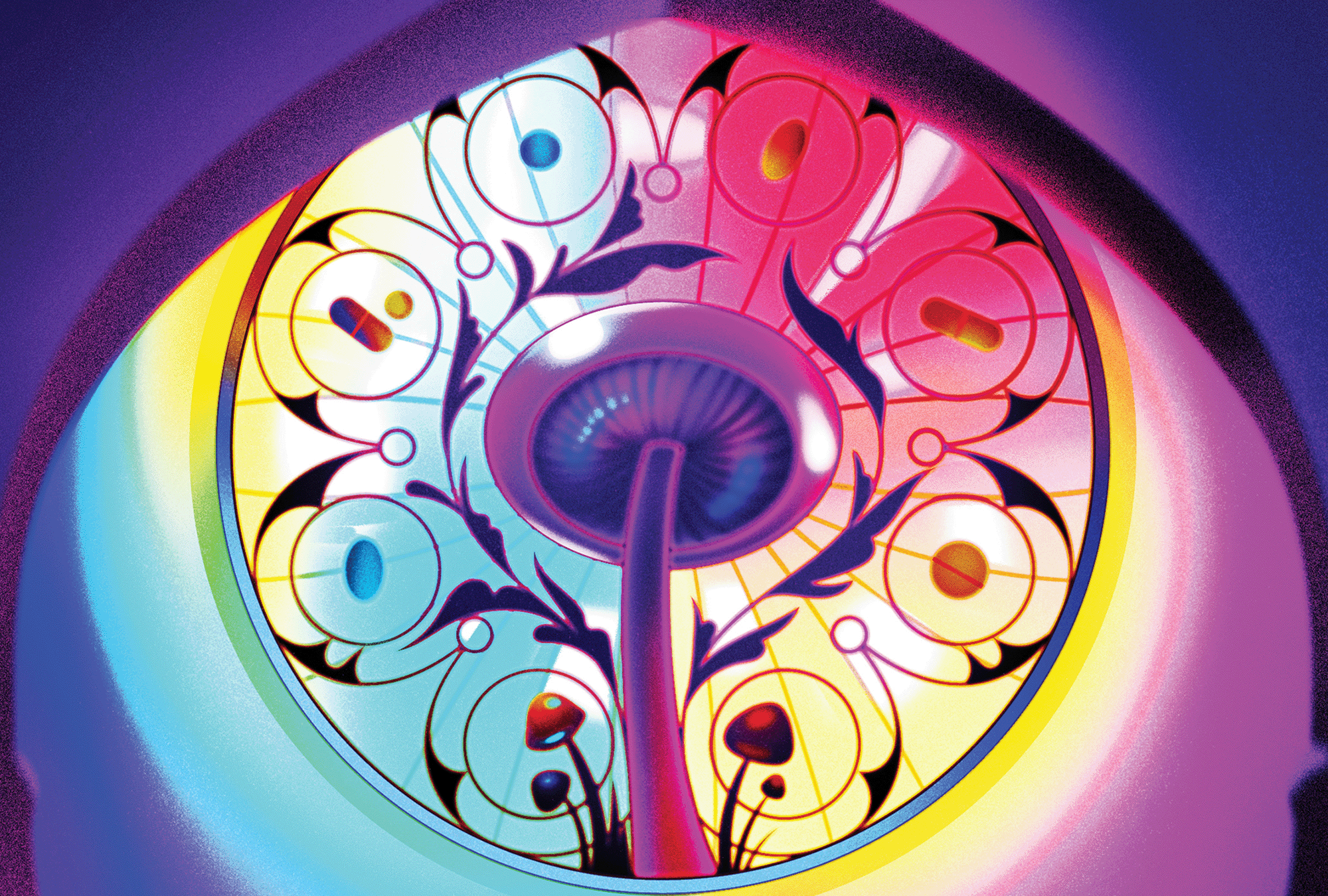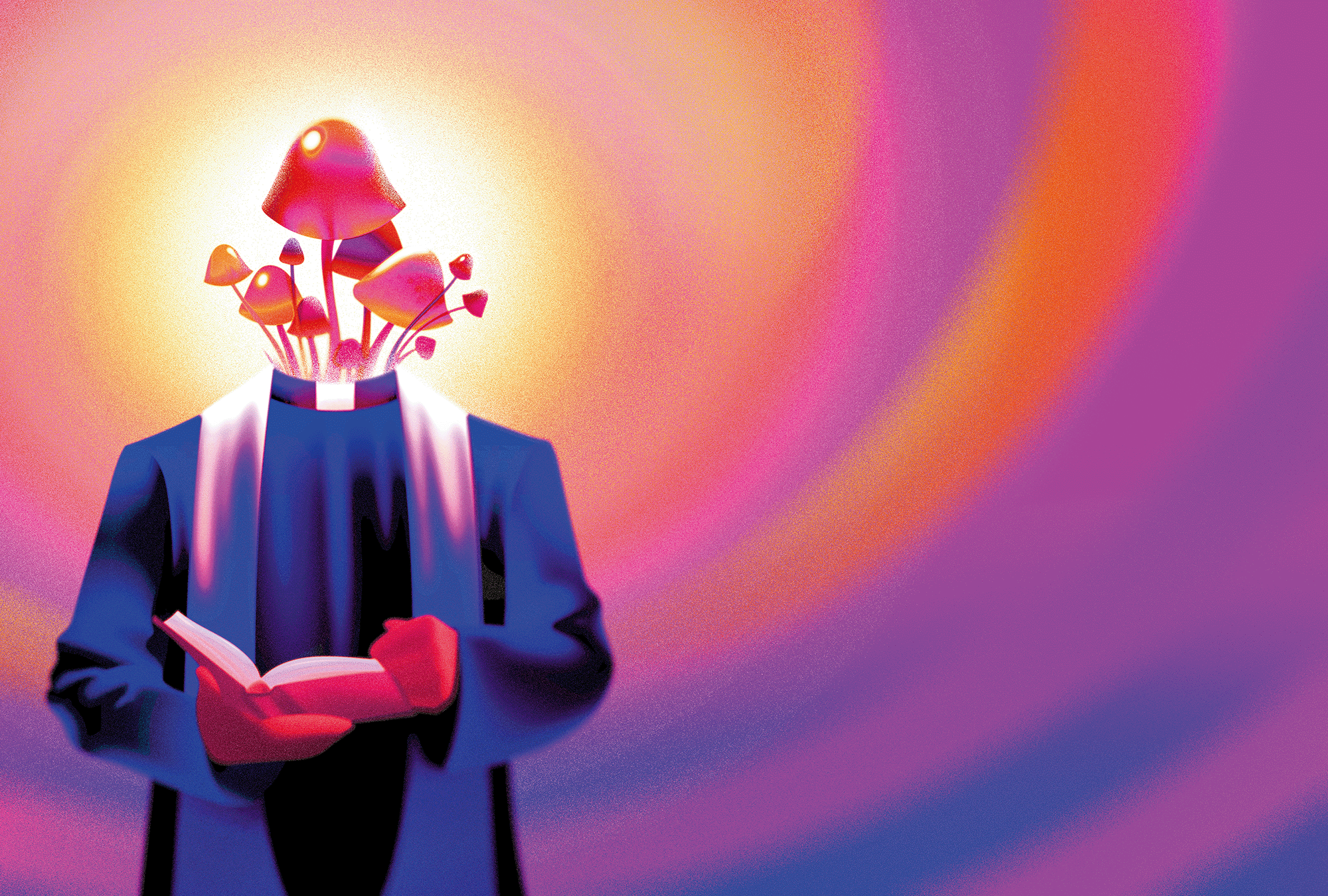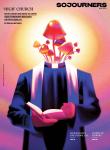Share As A Gift
Share a paywall-free link to this article.
This feature is only available for subscribers.
Start your subscription for as low as $4.95. Already a subscriber?

Illustrations by Simone Noronha
IT WAS DARK. Totally dark and empty. Andrea Smith felt a familiar hopelessness. “Of course I’m all alone,” she thought. “It’s my greatest fear.”
Smith, a pastor in the United Methodist Church, was at the Johns Hopkins Center for Psychedelic and Consciousness Research in Baltimore, in the first moments of a psilocybin trip designed for clergy.
“I didn’t know crap about psychedelics leading into it,” Smith told Sojourners. Through work with the center before her 2019 experiment with psilocybin (a psychoactive ingredient found in some mushrooms), she was prepared to possibly meet her greatest fears — some participants even reported seeing their own death. At first, that’s exactly what happened.
Smith’s profound childhood trauma — her mother suffered a fatal aneurysm in front of her at age 9 — had instilled an existential fear of being alone, she realized, which had led her to the brink of self-destruction. Burnt out in ministry, avoiding the truth about her husband’s infidelity, and grieving the death of her father, Smith entered the Johns Hopkins study in a fog of depression. She was considering returning to the antidepressants she’d stopped years before. “I was broken,” Smith said. “I was just exhausted and spent.”
During Smith’s psilocybin treatment, something shifted. She described moving “in and through” increasingly abstract and light-filled imagery that led her on what was ultimately, she said, a journey of redemption and forgiveness. She never got back on antidepressants, because the depressive fog lifted almost immediately after her psilocybin treatments. Smith credits the psilocybin experience with her ability to make major life changes.
The scientists at Johns Hopkins paved the way for contemporary research into the unique pharmacological properties of organic and synthetic compounds known collectively as “psychedelics.” In 2000, the Johns Hopkins team obtained the first regulatory approval in the U.S. to restart research into psychedelic use with healthy voluntary subjects. In 2006, the team published the first wave of results on the “safety and enduring positive effects of a single dose of psilocybin,” which helped catalyze a worldwide resurgence of psychedelics research.
Because so many research subjects — even those who are nonreligious — have reported “spiritual awakenings” among treatment outcomes, some researchers recommended anticipating these spiritual outcomes and integrating spiritual care into the therapeutic research setting. This has led to a multidisciplinary approach between researchers and religious professionals. In 2015, the Johns Hopkins team launched an investigation into the effects of psilocybin on the psychology and effectiveness of religious professionals, such as Smith. The results of that research are expected to be published this year.
Smith continues to draw upon and feel deeply connected to the source of light she encountered during the treatment. “It saved my life,” she said.

PSYCHEDELICS RESEARCH AND unsupervised experimentation boomed in the 1950s and 1960s — a period before the U.S. Food and Drug Administration placed regulations on drug approval or monitoring. Notorious examples from that era include illegal experimentation with psychedelics by the Central Intelligence Agency in search of a potential weapon for mind control and torture. CIA operation Project MK-Ultra bought up much of the world’s supply of LSD and brought it to the U.S, according to journalist Stephen Kinzer, and then tested it on human subjects without their knowledge or consent. The illegal program became public in 1975.
In the same era, Harvard psychologist Timothy Leary became a cultural icon for the promise of psychedelics as a gateway to expanding consciousness and mystical experience. Leary’s famous 1966 speech framed the use of psychedelics in spiritual terms: “Like every great religion, we seek to find the divinity within and to express this revelation in a life of glorification and the worship of God. These ancient goals we define in the metaphor of the present — turn on, tune in, drop out.” This resonated with a youth movement yearning for meaning and disenchanted with the religious and social establishments — and led to a rise in recreational use with no regulation.
The social and political backlash against excesses led to sweeping regulations on drugs and to a set of global drug policies led by the U.S. Since 1970, hallucinogens — such as organic psilocybin and mescaline as well as manufactured synthetics such as LSD and MDMA — have been classified by the U.S. Drug Enforcement Agency as Schedule I drugs, which the DEA defines as having a high potential for abuse and no currently accepted medical use.
RECENT YEARS HAVE seen the beginnings of a regulatory and research shift. State by state legislation to decriminalize or legalize some psychedelics has opened a patchwork of wellness centers and spiritual retreats that legally obtain and use these products in a controlled setting. (In 2020, Oregon became the first state to legalize psilocybin for therapeutic use.)
Along with the regulatory approval gained by Johns Hopkins in 2000, government-funded research has picked up in other countries as well — particularly in Canada, Switzerland, Israel, and the United Kingdom. In the U.S., private funding has helped establish psychedelic research divisions at several universities and institutions. In 2021 Johns Hopkins received the first federal funding for psychedelics research in more than 50 years, specifically to study the potential medical use of psilocybin on tobacco addiction.
A growing body of clinical research on psychedelic therapy supports part of Smith’s experience. Psychedelic treatments work by resetting neural processes and patterns of thinking that are often the root of mental health issues, changing the way patients process memory and information. Studies have found a variety of psychedelic drugs to be effective in reducing debilitating symptoms of depression, anxiety, PTSD, and addiction.
Research published in 2022 followed patients who received psilocybin treatment for major depressive disorder. Twelve months after receiving a second dose, most participants still experienced relief from depression symptoms, showed no use of psilocybin outside the study context, and rated “personal meaning, spiritual experience, and mystical experience” after the sessions as having increased their sense of well-being. Because of findings like these for medical use, the U.S. Food and Drug Administration in 2023 produced provisional guidance on psychedelics for clinical research and for commercial purposes.
For Smith, one reason she joined the study was to see if it offered hope for people she regularly encountered in pastoral ministry, especially those struggling with end-of-life depression, severe PTSD, and eating disorders. “I’ve seen people wrestle with those,” Smith said, “and if there are things out there that can help people heal in a transformational manner, we need to check that out.”
POLITICAL ADVOCATES — AND funders — have been enthusiastic, even evangelistic, about the potential benefits of psychedelics. In 2019, the Steven and Alexandra Cohen Foundation, technology investor Tim Ferriss, hedge fund founder Craig Nerenberg, WordPress co-founder Matt Mullenweg, and Toms founder Blake Mycoskie raised $17 million to launch and fund the first five years of the Johns Hopkins Center for Psychedelic and Consciousness Research.
Last summer, Mycoskie made public his $100 million pledge (a quarter of his net worth) to further medical and mental health psychedelics research. On CNBC’s Last Call in July 2023, Mycoskie said, “We have a mental health crisis in our country, and the modalities and the therapies that we’ve been trying to use for many years have just not increased the results, and we need to look to something different ... that’s why I’m very bullish on this from a philanthropic basis.”
While the medical potential may be high, there’s also big money to be made in the commercial sector. According to a recent report by BrandEssence Market Research, the commercial psychedelic pharmaceuticals market is poised to soar to $11.8 billion by 2029. As individual states legalize or decriminalize some psychedelics for use in medical, therapeutic, spiritual, or traditional wellness programs, along with unsupervised recreational purposes, market demand is expected to increase, driving up the value of related companies. With such big money behind marketing, some people are concerned that the public perception of psychedelics as good remedies for mental health may lead to unsupervised self-therapy before safety regulations are fully in place.

IN NOVEMBER 2023 the American Academy of Religion hosted a panel on Christians and psychedelics. Jaime Clark-Soles, a field researcher with the Center for Psychedelics and Spirituality at Emory University and a New Testament professor, raised concerns, even as she welcomed the therapeutic potential of psychedelics and its relevance to those engaged in healing ministries.
Clark-Soles emphasized how drug law enforcement falls disproportionately on communities of color. State-level changes on policies concerning the use of any Schedule I substance must keep the most impacted communities at the forefront. Therapeutic psychedelic treatments are also expensive, Clark-Soles said, creating an economic barrier. Currently, most therapeutic treatments take place in private clinics with hefty price tags, and many of them feel culturally white. Affording treatment is one hurdle, Clark-Soles said, but another obstacle, especially for women and people of color, is unease about submitting to being in an altered state in an unfamiliar environment. Bringing psychedelics into culturally sensitive contexts could help, she said.
“Psychedelics can be and are part of astonishing ... healing and transformation. These are powerful substances — and they also need to come with a warning because they are powerful,” Clark-Soles said in December. “All of us are concerned that, more and more, anybody can just hang out a shingle, offer a ‘spiritual’ psychedelic retreat,” Clark-Soles said. “We have new psychedelic ‘churches’ starting up. This should be an area of concern. And we should be part of educating folks to protect vulnerable people from abuse of power.”
Part of the CIA experimentation on nonvoluntary human subjects included illegal testing of LSD on prisoners and hospital psychiatric patients — many of whom were African Americans. While current psychedelic medical research includes more rigorous ethical and safety protocols, 82 percent of recent psychedelics research subjects are white. Only 2.5 percent are Black and 4.6 are of Indigenous origin. Because of this, current treatment outcomes cannot be generalized.
“The psychedelic community is in need of some civil rights action,” argued Kufikiri Imara, a plant-based health advocate and organizer, in a documentary titled A Table of Our Own. Imara sees a white culture looking to capitalize on traditional medicines that should be accessible to all. “We cannot let some corporation that is disconnected from these Indigenous practices turn this plant medicine into the next ‘happy pill,’” said Imara.
PARTS OF THE peyote cactus, which grows in the American Southwest and northern Mexico, contain mescaline, a powerful hallucinogen. For generations, traditional peoples in that region have incorporated peyote into sacred ceremony.
Even though the federal government classifies peyote as a Schedule I drug, Ramón J. Vásquez of the Native American Church of North America said his community doesn’t consider it a psychedelic. “You don’t ‘do’ peyote,” Vásquez said. “It’s a sacrament.” Vásquez said the plant is a direct sacred presence: The Native American Church recognizes peyote as the embodied presence of the Creator. Paraphrasing Quanah Parker, the last chief of the Quahadi Comanche people, Vásquez said, “We do not go into ceremony to talk about God. We go into ceremony to talk with God.”
As executive director of the nonprofit American Indians in Texas at the Spanish Colonial Missions, Vásquez negotiates the fraught relationship between the Christian church, the U.S. government, and all aspects of Indigenous culture, including sacred practices. Peyote only grows in a specific region, and stewards of the crop say that expanded use would endanger the supply for Native American Church members.
The United Nations is also monitoring the rising industry in psychedelic-related tourism, including the impact on Indigenous communities. In Central and South America, the plant-based hallucinogen ayahuasca is deeply rooted in Indigenous cultures. But as it has gained popularity among Americans and Europeans, a “spiritual tourism” industry has arisen, requiring travel to Peru or Costa Rica to use the drug. The more tourists have sought out ayahuasca-based psychedelic experience, the more crime, charlatanism, and overharvesting have followed, leading Indigenous groups to call for increased regulation to protect the integrity of cultural practices and the safety of communities where ceremonies take place.
“Once it’s gone, it’s gone,” Vásquez said, particularly of overharvesting. The struggle to preserve the peyote plant — and the Native American Church’s right to use it — has made many in his community wary of current conversations about renewed interest in psychedelics. “The fear is that, eventually, if peyote is not protected and regulated for the use of the aboriginal people it was intended for, you risk depletion, commercialization, and hybridization,” Vásquez said.
CLINICAL AND REGULATORY oversight may improve safety and limit exploitation, recreational use, unsupervised self-medication, and cultural appropriation. The growing body of data continues to contribute more predictability to what patients might expect in a medical-use setting. But now, as a movement to legalize certain psychedelic drugs for medical use has grown, so has curiosity about the spiritual dimension of these substances.
In 2016, Episcopal priest Hunt Priest participated in the Johns Hopkins clinical trial for clergy. He believes the therapeutic benefits are not separate from the spiritual experiences. Priest said he had mystical experiences as a child, but the process of seminary and ordination had left him “pretty disembodied,” he said. “I got very focused on how to figure things out intellectually.” Meanwhile, he struggled with anxiety and his ministry felt heavy to him. He decided to join the Johns Hopkins study when a friend recommended it — and was surprised by the layers of spiritual and religious awakening he experienced under the influence of psilocybin. Afterward, Priest’s anxiety abated.
But he realized he was craving something else the Christian church has historically provided: a healing community. What’s missing, Priest said, are regular and predictable avenues for people who have been helped by psychedelic experiences to find one another. That’s why he started Ligare, a ministry to encourage education, spiritual development, and support for the expansion of legal and safe psychedelics use within the context of the Christian contemplative tradition. [Jessica Felix Romero, a vice president of Sojourners with a role separate from the magazine, currently serves as the uncompensated chair of the board of Ligare.]
Those more skeptical of including psychedelics among sanctioned religious practices point out that contemplatives have reached higher states of consciousness for thousands of years without psychedelic assistance. As Benedictine contemplative David Steindl-Rast wrote in a 2001 essay, “A primary religious experience is no more (though no less) than a seed for a spiritual life. A genuine encounter with the Ultimate does not guarantee a genuine spirituality.”
Pastors such as Andrea Smith may not be preaching the gospel of psychedelics, but she has integrated the seeds of her experience into her view of ministry. Deep in her psilocybin trip, she said, she felt the release of many of the burdens she’d been carrying, things she’d thought were just a part of her. As the weight was lifted, she said, she saw and felt herself filled with light. Ministry wasn’t about simply carrying burdens anymore, Smith said. “My role here is to share light.”
Editor's note: This article was updated on April 25 to clarify that Jessica Felix Romero, a vice president of Sojourners with a role separate from the magazine, currently serves as the uncompensated chair of Ligare's board. An earlier version identified an unnamed Sojourners employee as a Ligare volunteer.

Got something to say about what you're reading? We value your feedback!